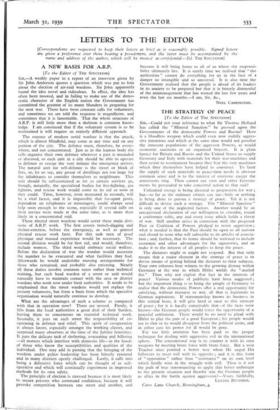THE STRATEGY OF PEACE
[To the Editor of THE SPECTATOR]
SIR,—Could not your reference to what Sir Thomas Holland has called the " Mineral Sanction " be pressed upon the Governments of the democratic Powers and Russia? Here is a bloodless weapon which could even now stultify aggres- sive intentions and which at the same time would not penalise the innocent populations of the aggressor Powers, as would economic sanctions or an organised boycott. It is plain lunacy for Britain and Russia and the United States to supply Germany and Italy with materials for their war-machines and then resort to rearmament because they fear the very machines which they themselves have helped to construct. To limit the supply of such materials to peace-time needs is obvious common sense and is to the interest of everyone except the armaments ring. Then cannot our own and other Govern- ments be persuaded to take concerted action to that end?
Unlimited energy is being directed to preparation for war ; but—so far as the ordinary citizen can see—little or nothing is being done to pursue a strategy of peace. Yet it is not difficult to devise such a strategy. The " Mineral Sanction " is only one of the neglected factors. Another would be an unequivocal declaration of our willingness to consider, round a conference table, any and every issue which holds a threat of war. Still another arises in connexion with the proposed Pact or Coalition of Powers pledged to resist aggression ; what is needed is that the Pact should be open to all nations and closed to none who will subscribe to its articles of associa- tion ; and, further, that its terms should be widened to include economic and other advantages for the signatories, and so make it to the interest of all peoples to keep the peace.
The dictators might or might not respond. But that only means that a major element in the strategy of peace is to devise means of getting behind the dictators to their subjects. Your own columns bear witness to the growing dismay within Germany at the way in which Hitler wields the " mailed fist." Then why not exploit that fact in the interests of peace? Various modes of publicity have been suggested ; but the important thing is to bring the people of Germany to realise that the democratic Powers offer a real opportunity for satisfying, without recourse to war, all that is legitimate in German aspirations. If statesmanship knows its business in this critical hour, it will give heed at once to this strategy of peace ; for it is hardly conceivable that—if the facts were known—the German people would reject the opportunity of a peaceful settlement. There would be no need to plead with Hitler to play the part of a good European ; his people would see to that or he would disappear from the political scene, and in either case his power for ill would be gone.
Far too little attention has been paid to the proper technique for dealing with aggressive evil in the international sphere. The conventional way is to counter it with its own weapons by meeting brute force with brute forte. But a wise Teacher once pointed a better way when He urged His followers to meet evil with its opposite ; and it is this form of " opposition " rather than " resistance " on its own level which finally wins in the struggle with evil. Then is it not the path of true statesmanship to apply this better technique to the present situation and thereby win the German people as allies in the battle against aggression?—Yours faithfully,
Carrs Lane Church, Birmingham, 4.
LEYTON RICHARDS.


































































 Previous page
Previous page